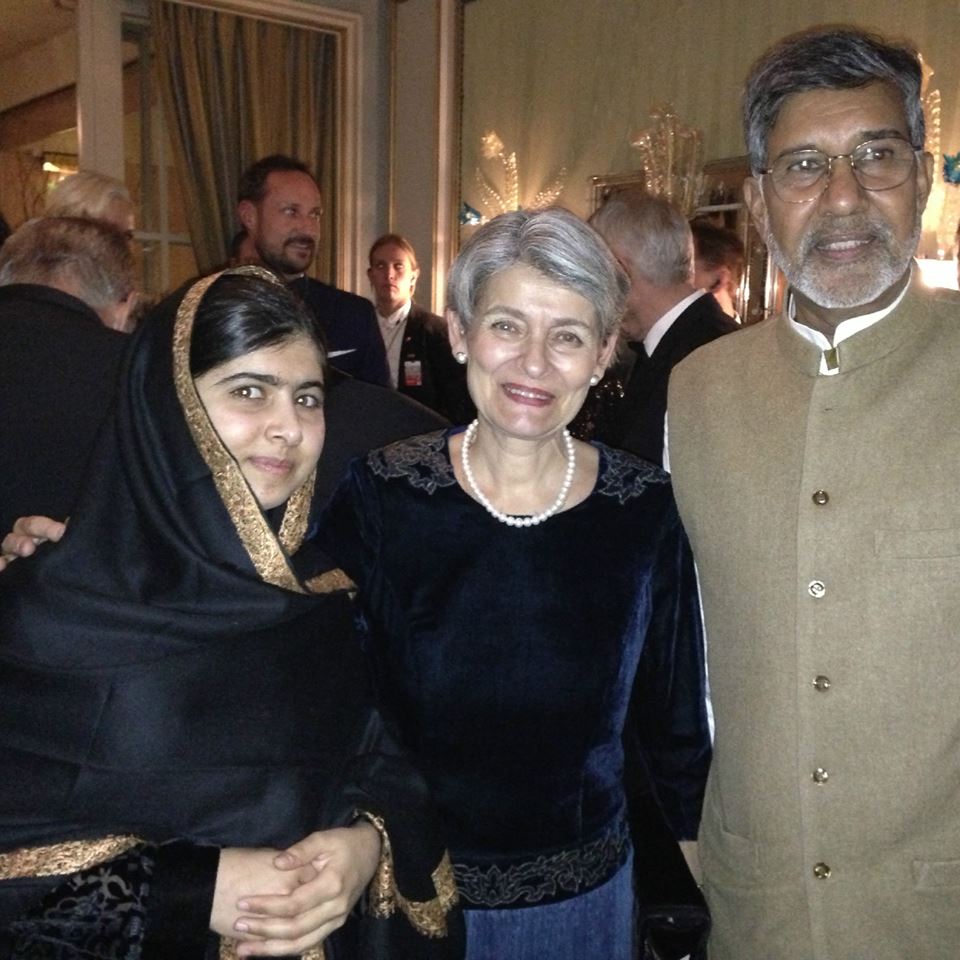IRINA BOKOVA CELEBRATES THE NOBEL LAUREATES OF PEACE AND EDUCATION
UNESCO Director-General Irina Bokova celebrated the awarding of the Nobel Peace Prize to two ardent education activists from Pakistan and India, Malala Yousafzay and Kailash Satyarthi, in a stirring ceremony at Oslo City Hall, followed later by the traditional Nobel Banquet at the Grand Hotel on 10 December.“We could not have heard two more passionate appeals today for education, for global compassion and solidarity, for justice in our globalized world where millions of young human beings are being left behind. Malala Yousafzay and Kailash Satyarthi belong to two different generations but they share the same courage and the same struggle for education, non-violence and peace.

Author: UNESCO
Photo: Daply Ossey Yolande
UNESCO Director-General Irina Bokova celebrated the awarding of the Nobel Peace Prize to two ardent education activists from Pakistan and India, Malala Yousafzay and Kailash Satyarthi, in a stirring ceremony at Oslo City Hall, followed later by the traditional Nobel Banquet at the Grand Hotel on 10 December.
“We could not have heard two more passionate appeals today for education, for global compassion and solidarity, for justice in our globalized world where millions of young human beings are being left behind. Malala Yousafzay and Kailash Satyarthi belong to two different generations but they share the same courage and the same struggle for education, non-violence and peace. They spoke today for all those who do not have a voice, who are deprived of their childhood and their basic human rights, especially young girls. It is our collective responsibility to act with urgency and conviction now to make the right to quality education come true for all children and youth in this generation,” she said.
The co-recipients are sharing the Prize for their “struggle against the suppression of children and young people and for the right of all children to education.”
In his acceptance lecture, Mr Satyarthi feared that “the biggest crisis knocking on the doors of humankind are fear and intolerance… Rights, security and hope can only be restored through education.” Challenging the culture of silence, neutrality and passivity, he called upon governments to invest in education and young people, and for the world to “march from exploitation to education, from poverty to shared prosperity… Let us democratize knowledge, universalize justice and globalize compassion.”
Malala Yousafzay, the youngest laureate to receive the Nobel Peace Prize at 17 years old, dedicated her award to the “forgotten children who want education, the voiceless persons who want change… the 66 million girls who are not in school. I am here to stand up for their rights and raise their voice. It is not time to pity them, it is time to take action. Let us become the first generation to decide to be the last to see empty classrooms, wasted potential and lost childhoods. I will continue this fight until I see every child in school,” she said, stating that she would dedicate her prize money to giving girls quality education, starting in her own country and village.
Building on the appeal of the Nobel laureates for global action to making the right to education universal, Norway’s Foreign Minister Borge Brende voiced hope that the downward trend in core funding for education since 2009 could be reversed through strong partnership that combines national resource mobilization with donor support. In a wide-ranging meeting with the Director-General, the Minister referred to Norway’s White Paper on “Education for Development” currently under discussion in Parliament.
The Paper affirms that Norway will be a driving force in making education a high priority in international development cooperation, and places strong focus on reaching those in greatest need, especially girls. In September, at an event organized by the UN Global Education First Initiative during the UN General Assembly, Norway’s Prime Minister Erna Solberg announced that her Government will double financial support for good quality education over the next three years. Minister Brende said that an additional USD100 million had been mobilized for education, sending a strong signal of commitment.
The Director-General expressed appreciation for Norway’s leadership on education and, more broadly, for its strong commitment to UNESCO. Minister Brende and the Director-General discussed the process in motion to reach agreement on sustainable development goals that are universal and framed to eradicate extreme poverty by 2030, concurring on the importance of monitoring, evaluation and financing. Norway intends to play a role in keeping up the momentum on education, through the organization of a Conference that will be a bridge between the World Education Forum in Incheon, (Republic of Korea), in May 2015, and the Addis Conference on Financing for Development in July 2015, through to the UN General Assembly in September.
The Director-General also informed Minister Brende about UNESCO’s mobilization to protect heritage in Iraq and Syria, including through the UN Security Council to connect the political, humanitarian and cultural dimensions of the conflict. He welcomed her call to establish protected cultural zones around heritage sites in Syria and Iraq, measures to fight against the illicit trafficking of works of art – a source of financing for terrorism and extremism – and the defense of cultural diversity in the face of the persecution of minorities.
The Director-General noted the importance of Norway’s support for the conservation and digitization of ancient manuscripts in Mali, and for its recent contribution to the UNESCO Action Plan for Iraq in the field of cultural heritage.
The breadth of Norway’s cooperation was also reviewed during a meeting with Ms Tora Aasland, Mr Peter Mosby Haugan and Ms Tanja Hegge, respectively President, Vice-President and Secretary-General of the Norwegian National Commission for UNESCO. The Commission members focused on prioritizing education, supporting the Intergovernmental Oceanographic Commission, protecting freedom of expression and the safety of journalists, and the safeguarding of cultural heritage in conflict. “It is rewarding that Norway follows UNESCO’s priorities so closely,” said the Director-General, reiterating appreciation for Norway’s active commitment to the Organization.



